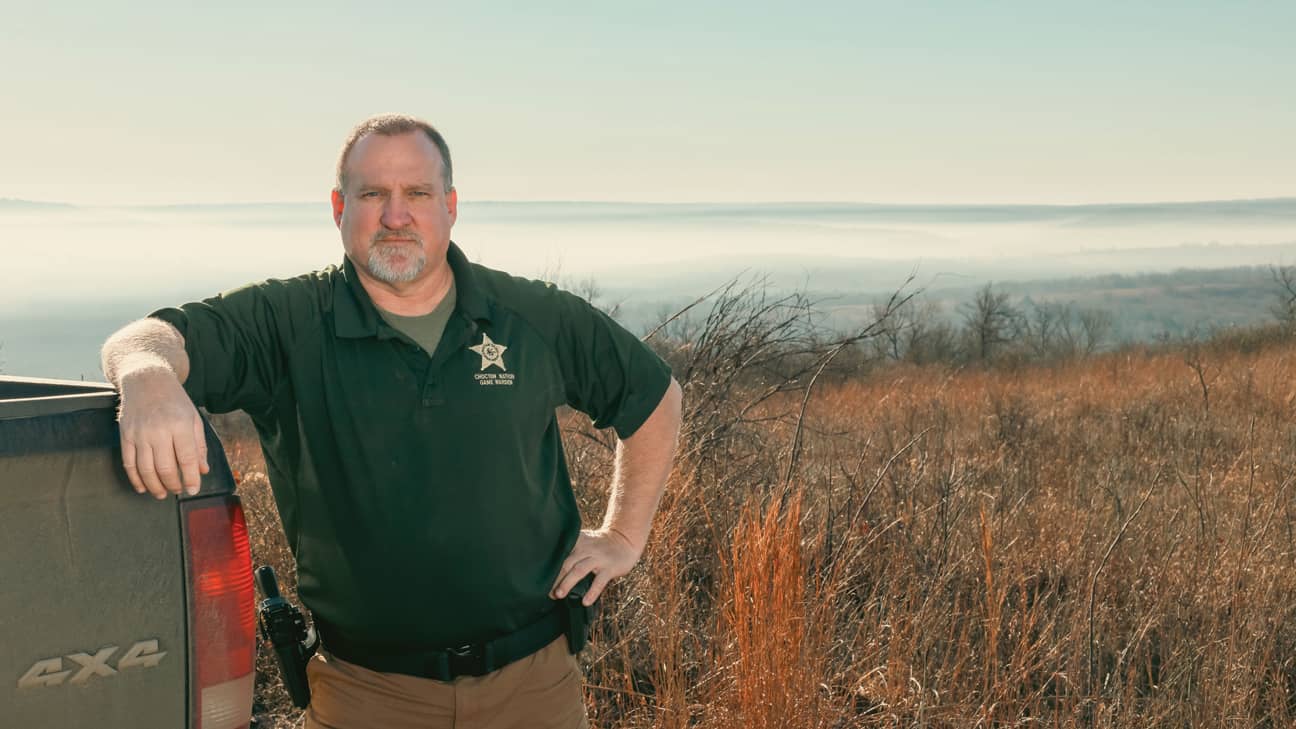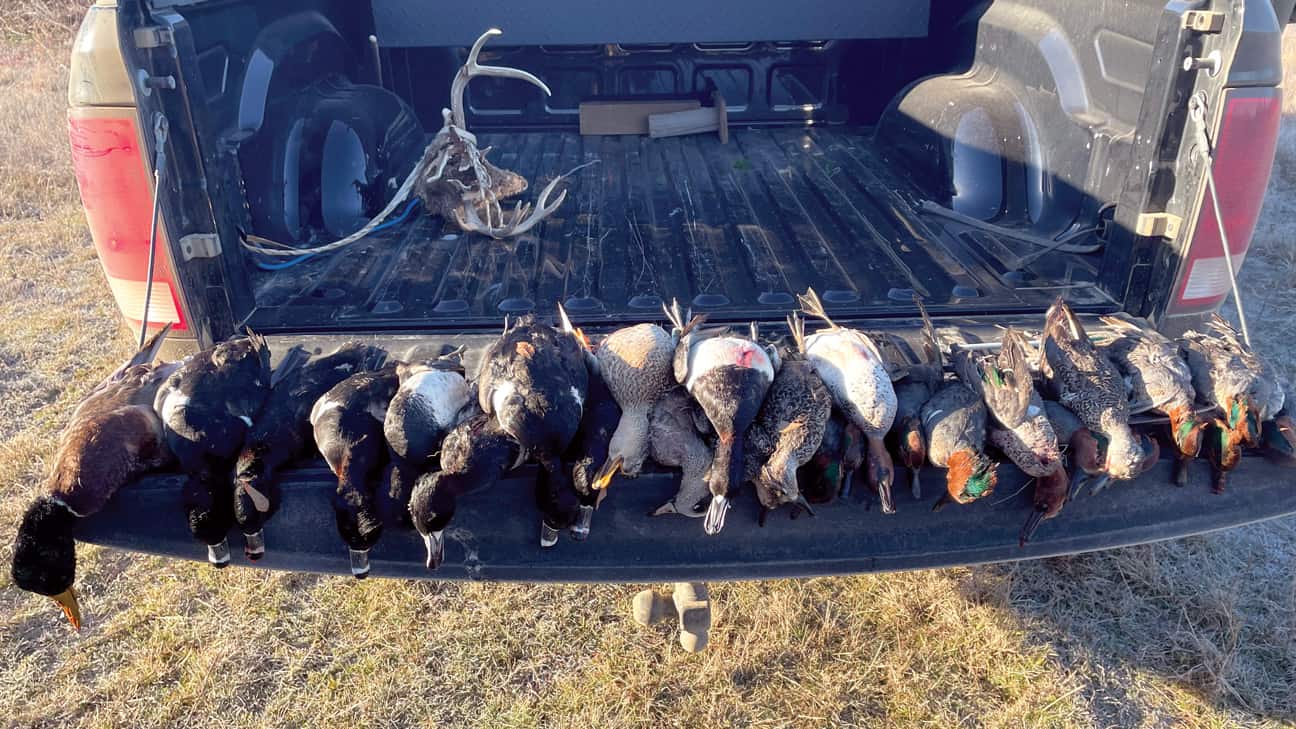
Choctaw Nation Game Warden Jay Harvey bring 30 years of experience to the Nation.
The Choctaw Nation Continuing Wildlife Conservation Efforts
Published March 5, 2024By Christian Toews
The Choctaw Nation’s game warden recently collaborated with state and federal game wardens on a waterfowl case within the Choctaw Nation reservation.
The discovery of a pond heavily baited with corn, a highly illegal act, led the wardens to investigate. During the investigation, the wardens observed the pond for three days until a group of hunters returned to the pond. The wardens contacted the men, and 26 illegally taken ducks were confiscated.
According to Jay Harvey, the Game Warden for the Choctaw Nation, one man was cited for placing and hunting over the bait, and two others were cited for not having the proper licenses. Other charges are pending on other individuals who helped place the bait.
Cases like this are among the many reasons the Choctaw Nation has begun to dedicate resources to wildlife conservation.
At the end of 2021, Oklahoma Governor Kevin Stitt announced he would not renew the standing hunting and fishing compacts with tribal governments after they expire at the end of 2021.
These compacts were the country’s first state-tribal agreements of their kind, capturing millions of federal dollars for wildlife management. Over its lifetime, the Choctaw Compact accounted for $6 million in funding.

The Oklahoma Department of Wildlife Conservation dedicated that funding to wildlife management planning and operations, law enforcement, and conservation efforts, which benefits all Oklahomans, Native and non-Native.
When Governor Stitt canceled the compact renewal, the Tribal Council unanimously voted to amend the Choctaw Nation of Oklahoma Fish, Game, and Animals Code. The Tribal Council said it will continue to adjust the Nation’s laws to maintain good stewardship of its resources because wildlife conservation is an evolving field that requires constant attention and study.
While the Choctaw Nation currently only has one Game Warden, he works closely with Choctaw Lighthorse officers and even state and federal officials to enforce Choctaw Tribal Law and State Law.
Harvey was a Game Warden with the State of Oklahoma for 30 years before coming to the Choctaw Nation. According to Harvey, the job can be a lot of work but very fulfilling.
“Game Wardens don’t have the same resources that some large departments have, so when investigating something, I often have to gather the evidence myself, which can slow the investigation,” Harvey said. “Most of the time, my days involve patrolling and following tips from hunters, landowners, Lighthorse or other agencies,” he said.
Harvey is thankful for the support he receives from other state and federal organizations when working on an investigation.
According to Harvey, many tribal members are still unaware of the laws, and he hopes to educate and help people avoid doing anything unlawful. He said one of the biggest challenges they face is education about where to report a harvest.
Many tribal members are still reporting their harvests on the State’s website, and Choctaw Nation regulations require tribal members to register their harvest via the Choctaw Nation wildlife conservation webpages.
According to Devin Lindley, Conservation Education Outreach Coordinator for the Choctaw Nation, these harvest numbers are essential to wildlife conservation because these numbers help to set limits and regulations to preserve the Choctaw Nation’s resources appropriately.
The Wildlife management programs have significantly impacted the numbers of hunters within the Choctaw Nation’s reservation.
“We’ve seen a lot more hunting and fishing from tribal members,” said Lindley. “We have seen an increase in female hunters and a large increase in 11 to 15-year-old hunters. Both are well above the national average.”
One of the services offered by the Wildlife Conservation Department is a Hunter Education Course. This online course is free and available to anyone. After completing the course, you will receive a hunter education card valid for life in all 50 states.
According to Lindley, it is also recognized all over the world.
“I know people like to travel and hunt so that will help them out,” he said.
Whether you are a new hunter or have been hunting your whole life, knowing the law is an essential part of hunting.
As a Choctaw Nation Tribal member, staying informed on the regulations and conservation efforts is crucial because these can sometimes differ from the State’s laws.
Harvey encourages all tribal members to visit the Choctaw conservation webpages to learn more about how you can help protect Choctaw Nation resources.
Another way to stay informed is by following the Choctaw Nation Environmental Protection Service on Facebook.